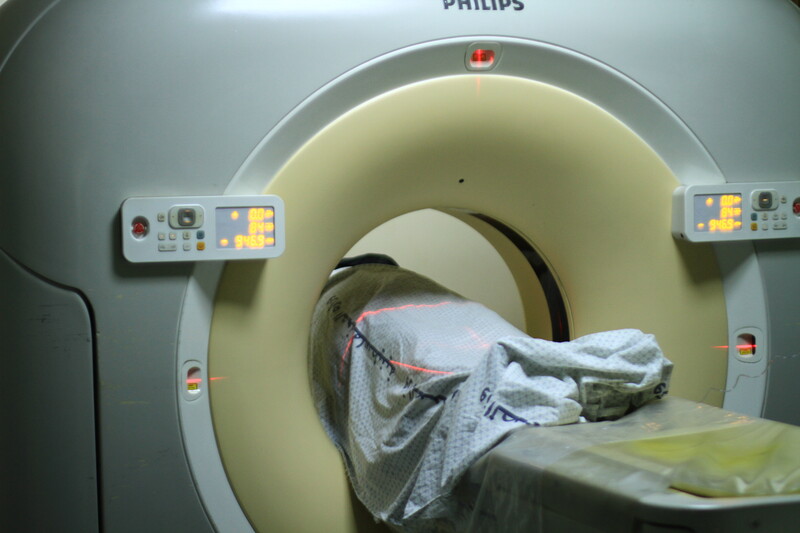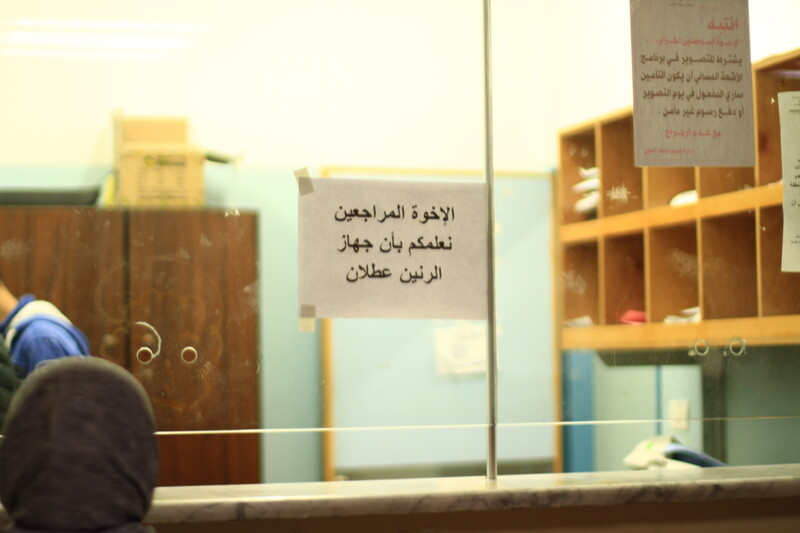The Electronic Intifada 23 December 2021

Fahid Afana — pictured with his son Muhammad — was denied travel permits by Israel for more than three months, causing him to miss vital medical appointments.
Fahid Afana spent months waiting for a message on his mobile phone.
The message he wanted was a simple one: that he would be allowed to leave Gaza to receive treatment for lymphoma in Israel.
Afana, 31, had an appointment with Rambam hospital in Haifa scheduled for 23 August this year. Yet it was not until December that he was permitted to leave Gaza for Haifa – a city in Israel – over a three-day period.
Patients often have to overcome major bureaucratic obstacles so that they can travel for care unavailable within Gaza’s health care system.
First, Afana had to submit his application for a travel permit via the Palestinian Authority. The PA then forwards all such bids to the Israeli military occupation.
After carrying out the required paperwork, Afana was informed that Israel was doing a “security” check on him. He was puzzled by that news as he had previously been to Rambam hospital on many occasions, without the Israeli authorities raising objections.
“Once I got that information, I knew the doors of hell would open,” he said. “I asked myself why. I hadn’t done anything wrong. I followed every single instruction they gave me.”
Afana contacted the hospital’s administrators. They replied that they had no issue with him but had no power to overturn decisions made by the Israeli military.
He also asked the Palestinian Authority why he was subject to a “security” check. The PA replied that Israel usually does not provide such details.
Afana was originally diagnosed with lymphoma in 2015.
Accessing treatment has long been a struggle for him.
Some of his treatment was only received after a petition was lodged with Israel’s high court. Because of that petition – filed by the Gaza-based Palestinian Centre for Human Rights during 2018 – he then received treatment from Augusta Victoria Hospital in occupied East Jerusalem.
Unfortunately, the radiotherapy he underwent in that hospital proved unsuccessful. So it was recommended that he receive further care in Israel or Jordan.
Afana first went to Haifa’s Rambam hospital in 2018. He responded well to the radiotherapy offered there and then headed back to Gaza.
He kept on making monthly trips to Haifa for checkups until Israel banned him from doing so in August this year.
While he was banned, his condition deteriorated. He later learned that his cancer had spread.
By blocking him from going to his 23 August appointment, Israel inflicted enormous anxiety on him and his family. Afana feared that he would die soon, leaving his two children without a father.
The radiotherapy prescribed to him at Rambam hospital is unavailable within Gaza. As he waited for permission to travel, Afana’s pain became increasingly severe.
Israel’s actions led to a delay of more than three months in his treatment.
“I can’t eat or sleep much,” he said – speaking before his permit to travel in December was eventually granted.
Cruel restrictions
Receiving treatment promptly can literally mean the difference between life and death for people with cancer and other serious diseases. Israel – which has subjected Gaza to a full blockade since 2007 – often blocks patients from receiving essential care for long periods.
Israel only approved 31 percent of applications to travel from Gaza’s medical patients in May this year. During that same month, Israel mounted a major attack on Gaza which lasted 11 days – frequently targeting health care facilities and their environs.
The rate of permit approvals remains low. According to the World Health Organization, 54 percent of 1,370 requests for patients to leave Gaza via the Erez military checkpoint were authorized by Israel during September this year.
That was one of the two lowest rates of approval since April 2019.

Amid the COVID-19 pandemic, Israel has restricted the entry of medical equipment and spare parts into Gaza.
As well as delaying patients from leaving Gaza, Israel has placed restrictions on the entry of medical equipment. Al Mezan, a human rights group, complained in October that Israel had banned diagnostic medical devices for patients with COVID-19.
Bassam al-Hammadin, a representative of Gaza’s health ministry, stated that Israel banned eight mobile X-ray devices for a total of 10 months this year before allowing them to enter.
“We only have three MRI [magnetic resonance imaging] devices in Gaza,” al-Hammadin added. “And they have banned spare parts for these devices.”
These restrictions are all the more cruel given that they have been imposed amid a pandemic.
“Scared to death”
Fida, 39, from Khan Younis in southern Gaza, has breast cancer. She recently required an MRI scan but was unable to have one in the European Gaza Hospital, which is located near Khan Younis.
The European Hospital has been the main facility in Gaza treating people with COVID-19 this year. Its equipment has been in heavy demand.

A notice in Gaza City’s al-Shifa hospital states that its MRI machine is out of order.
After an 18-day wait, Fida finally managed to have a scan in Gaza City’s al-Shifa hospital during November. “You can’t imagine how painful the wait was,” she said.
Before then, she had been able to secure an appointment for an MRI scan within a few days.
Fida has previously received treatment in Jerusalem. Obtaining that treatment required her to be away from her family for a lengthy period of time between November 2020 and January this year.
That lengthy absence had a marked effect on her family, especially her 3-year-old son.
“He cries whenever he sees bags for traveling,” Fida said. “He thinks I will be away from him for another 65 days.”
So far Israel has granted Fida the permits she needs for travel. But there is no guarantee that Israel will do so if she applies for further permits.
“I am scared to death about traveling again to Jerusalem,” she said. “I don’t want to leave my family for a long time once again.”
Ahmed Al-Sammak is a journalist based in Gaza.





